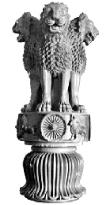Creating
A Sense of Allegiance in the Mauryan Empire
In
any civilization, it is vital that the people feel united and have a sense
of allegiance to the empire. If there is a lack of allegiance, the people
do not feel compelled to follow orders, or care about certain problems of
the state. If they are requested to do something or comply by some law they
disaggree with, they will more likely than not rebel against the rulers.
Obviously, creating a sense of allegiance is important for any ruler or government,
as it essential to the well-being of the empire internally. 
It is difficult to tell whether or not
the people of the Mauryan Empire felt a sense of allegiance to their empire.
However, one can easily see the leaders' conscious attempt to keep its people
happy. We see from the government set up by Chandragupta (always available
to hear complaints, spies and informers), that ensuring the happiness of
the people was foremost on the rulers' minds. Asoka especially, after converting
to Buddhism, started policies showing his love for his people and to create
a sense of unity among them. He eased some of the penalties set up by the
harsh laws, and although he didnt banish the death penalty, he instated
a policy that gave the person 3 days of rest and peace beforehand. He proclaimed
all his people his sons and daughters, and tried to enforce good morals
and obedience. He also created a committee especially for enforcing those
morals. Despite his great Buddhist belief, he was tolerant of other religions
as well; although he did use his belief to try to unite his people.
(Upshur)
It is easy to see how the empire fell apart after the
death of a leader who showed such compassion for his people. From the policies
of the rulers of the Mauryan dynasty, one can infer that Mauryan citizens
felt a fairly strong allegiance to the Mauryan empire.
